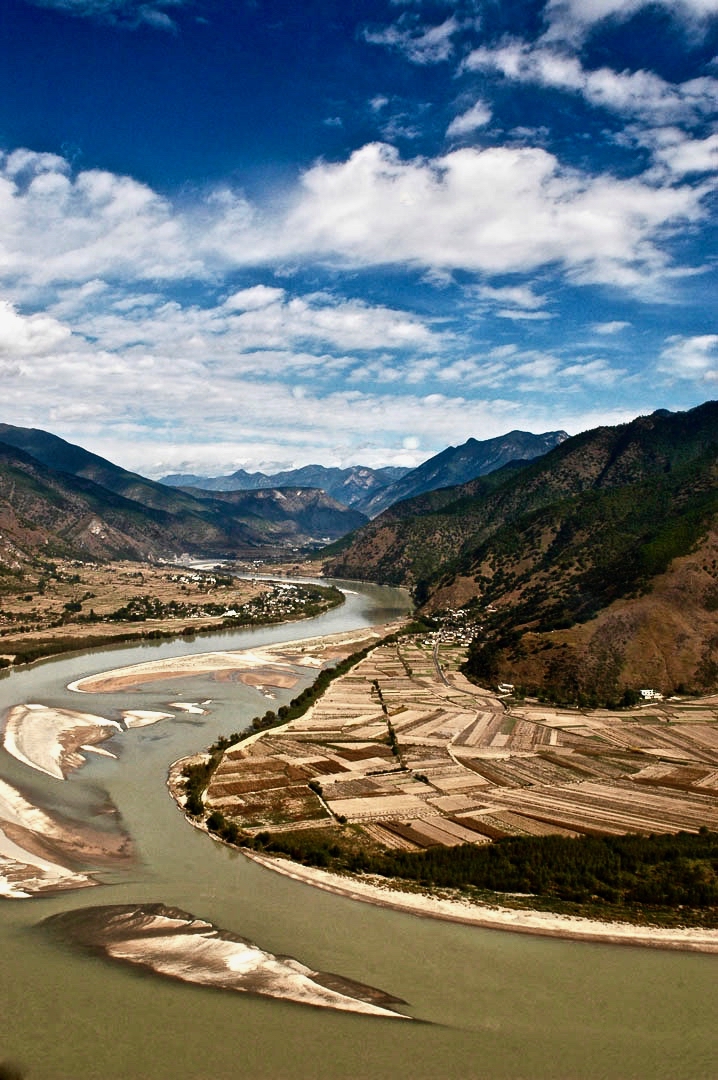It was here at the ‘first bend of the Yangtze’ in Yunnan province that the Mongolian armies of the Yuan Dynasty crossed the great waterway and would ‘take’ the previously independent region into the greater fold of the Middle Kingdom 中国 (China).

This was also a key stopping point along the Tea Horse Road where our team would pass through. Wandering through an area of rough overgrown foliage just west of the village of Shigu, we would (with the help of locals) come upon a small grave site with old headstones which were engraved with various designs of the horse. Tiny and inconsequential, it was as if the site had been forgotten except by the mosses and the foliage that reclaimed the bit of space at the base of a mountain. These, we were told, were what was left of a small collection of muleteers and tea traders who had passed away at or near this point upon the trade route over the course of years. A final place of rest with a stunning view for a few who could go no further and for those whose homes and families were distant. Looking ‘up’ the Yangtze we could just begin to make out the snow peaks that marked the unofficial gateway into the Himalayas. As a aside, none of the teas we sipped in this region gave any satisfaction, except for a rippingly pungent bit of Puerh we had with us.

About JeffFuchs
Bio
Having lived for most of the past decade in Asia, Fuchs’ work has centered on indigenous mountain cultures, oral histories with an obsessive interest in tea. His photos and stories have appeared on three continents in award-winning publications Kyoto Journal, TRVL, and Outpost Magazine, as well as The Spanish Expedition Society, The Earth, Silkroad Foundation, The China Post Newspaper, The Toronto Star, The South China Morning Post and Traveler amongst others. Various pieces of his work are part of private collections in Europe, North America and Asia and he serves as the Asian Editor at Large for Canada’s award-winning Outpost magazine.
Fuchs is the Wild China Explorer of the Year for 2011 for sustainable exploration of the Himalayan Trade Routes. He recently completed a month long expedition a previously undocumented ancient nomadic salt route at 4,000 metres becoming the first westerner to travel the Tsa’lam ‘salt road’ through Qinghai.
Fuchs has written on indigenous perspectives for UNESCO, and has having consulted for National Geographic. Fuchs is a member of the fabled Explorers Club, which supports sustainable exploration and research.
Jeff has worked with schools and universities, giving talks on both the importance of oral traditions, tea and mountain cultures. He has spoken to the prestigious Spanish Geographic Society in Madrid on culture and trade through the Himalayas and his sold out talk at the Museum of Nature in Canada focused on the enduring importance of oral narratives and the Himalayan trade routes.
His recently released book ‘The Ancient Tea Horse Road’ (Penguin-Viking Publishers) details his 8-month groundbreaking journey traveling and chronicling one of the world’s great trade routes, The Tea Horse Road. Fuchs is the first westerner to have completed the entire route stretching almost six thousand kilometers through the Himalayas a dozen cultures.
He makes his home in ‘Shangrila’, northwestern Yunnan upon the eastern extension of the Himalayan range where tea and mountains abound; and where he leads expeditions the award winning ‘Tea Horse Road Journey’ with Wild China along portions of the Ancient Tea Horse Road.
To keep fueled up for life Fuchs co-founded JalamTeas which keeps him deep in the green while high in the hills.

